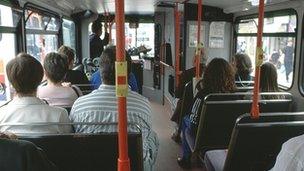Bus market not competitive, Competition Commission says
- Published

Passengers are losing out because of a lack of competition, the commission says
A lack of competition in the UK's local bus market has meant poorer services and higher fares for passengers, the Competition Commission has said.
"Head-to-head competition is uncommon," the commission said, as it outlined measures to improve the situation.
Bus firms will be banned from "over-bussing" and other short-term measures designed to keep out new rivals.
They will also have to share bus stations with competitors and accept "multi-operator ticketing schemes".
The Confederation of Passenger Transport UK (CPT), which represents bus companies, said it could not agree with all the commission's findings. CPT chief executive Simon Posner said there was "always room for improvement and we will now have a closer look at the changes that have been suggested".
He called the commission's investigation "long and time-consuming", and said "the single biggest message to come out of this process is that, while measures need to be taken to further open up the market to competition, the current commercialised framework for delivering bus services is what serves the passenger best".
A spokesman for bus operator Arriva said the company would "consider the lengthy report carefully", but did "regret that the CC seems not to have taken this opportunity to address the impact of competition from private transport which is the main reason behind falling usage of what is a very efficient bus industry".
Avoiding competition
UK bus services were first deregulated 25 years ago, with the exception of London and Northern Ireland.
However, according to Jeremy Peat, chairman of the Competition Commission's local bus market investigation group, the "reality is that in too many areas of the country, competition has stagnated and the incumbent providers know that they face little in the way of serious challenge".
"As such, the incentive to increase services, innovate and even lower fares is absent."
The commission's report found that in one area, the north-east of England, it had seen "direct evidence" of bus firms avoiding "competition with each other in order to protect their own territories".
Keeping rivals out
However, deregulation had failed to deliver the "sustained competition" that allowed companies to take on existing providers of bus services, the commission found.
It blamed "operator behaviour" for keeping rivals out, with some companies using short-term measures such as suddenly increasing the frequency of their bus services until a rival had left the market.
There are 1,245 bus companies operating in England, Scotland and Wales, but just five of them: Arriva, FirstGroup, Go-Ahead, National Express and Stagecoach, carry 70% of all passengers.
The commission said the Office of Fair Trading should exercise "its discretion not to refer small mergers" of bus operators to the Competition Commission. Local Transport Authorities, meanwhile, are being asked to consider "partnerships" with new operators to increase competition in their local areas.
- Published6 October 2011
- Published6 May 2011